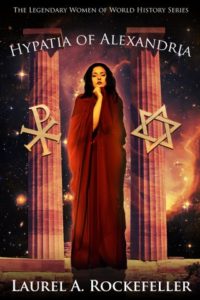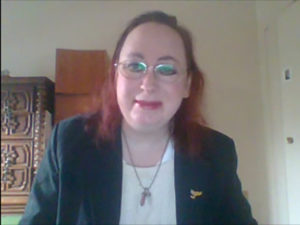
*3 custom Candles , Signed Paperback
Follow the tour HERE for exclusive excerpts, guest posts and a giveaway!



Hypatia of Alexandria
The Legendary Women of World History #8
by Laurel A. Rockefeller
Genre: YA Historical Fiction
Teacher. Philosopher. Astronomer.
Born in 355 CE. In the aftermath of Constantine’s reign Hypatia of Alexandria lived in a collapsing Rome Empire, a world where obedience to religious authorities trumped science, where reason and logic threatened the new world order. It was a world on the edge of the Dark Ages. As libraries burned, she dared defend the light of knowledge.
Only .99 cents!!
Amazon * Apple * B&N * Kobo * Smashwords


Born, raised, and educated in Lincoln, Nebraska USA Laurel A. Rockefeller is author of over twenty books published and self-published since August, 2012 and in languages ranging from Welsh to Spanish to Chinese and everything in between. A dedicated scholar and biographical historian, Ms. Rockefeller is passionate about education and improving history literacy worldwide.
With her lyrical writing style, Laurel’s books are as beautiful to read as they are informative.
In her spare time, Laurel enjoys spending time with her cockatiels, attending living history activities, travelling to historic places in both the United States and United Kingdom, and watching classic motion pictures and classic television series.
Website * Facebook * Twitter * Pinterest * YouTube * Amazon * Goodreads

One year later Hypatia sat at a small wooden table. Carefully copying letters from a baked clay tablet, she etched practice lines of each letter into the wax sheet in front of her. Theon bent over her shoulder, “Excellent, except your lower case xi ξ and zêta ζ need work. Here, let me show you.” Picking up a second tablet and stylus from the table, Theon slowly transcribed the two characters in front of her. Hypatia copied her father. Theon smiled with approval, “Much better. Practice those until it fills up your tablet. After dinner, I will bring you up to the roof for more lessons.”
Three hours later Hypatia followed her father up the stairs to the roof, grateful for her heavy woollen palla which warmed her against the autumn night chill. Above them the stars wheeled majestically. Hypatia smiled at the beauty of the sky. Theon stepped to a small table and picked up his cross staff. Turning to the north he put the cross staff up to his cheek and measured the angular distance between Polaris in Ursa Minor and Alpha Ursae Majoris in Ursa Major.
Hypatia walked up to him, “What are you doing?”
“Measuring the distance between the pole star and that bright star near it.”
“May I try?”
Theon lowered his cross staff and handed it to Hypatia, “That star is called Alpha Ursae Majoris. It’s part of a constellation called Ursa Major –the big bear. Callisto was a beautiful nymph sworn to Artemis. One day Zeus fell in love with her and she conceived a son. Hera of course was very angry that her husband had cheated on her again and turned her into a bear. One day her son, a young man named Arcas, met her in the forest. Naturally he was afraid that she would kill him—as bears often do when humans get too close. So, Zeus intervened and put them both in the sky. The mother is the great bear Ursa Major and the son is the little bear Ursa Minor. Callisto’s body is formed by many stars, Alpha Ursae Majoris being the closest to Arcas’ tail. If you will look here, the tip of that tail is the current pole star, Polaris.”
Hypatia smiled, “It’s beautiful! Why do you say ‘current’ pole star?”
“Because Polaris is not always the pole star. Sometimes it is Alpha Lyrae. About six hundred years ago, Hipparchus of Nicaea discovered, almost by accident, that the spin of the Earth is imperfect. Like a top, it wobbles so that the pole star alternates between Polaris and Alpha Lyrae. It takes a very long time, of course. The wobble is very slight – about one degree every seventy-two years. So as far as we need to be concerned Polaris is the pole star—and will continue to be for a very long time.”
“So if I want to find north, all I need to do is look for Alpha Ursae Majoris and I will quickly find Polaris?”
“Yes. It is as easy as that—at least at night it is.”
“This is amazing, Father! I had no idea there was so much to learn about the stars!”
“The discoveries have only begun, Hypatia. Perhaps you will make discoveries that will change the world.”
“I would like that very much! To learn all about the stars, all the secrets of the heavens and the earth. Will the gods reward me or punish me if I make this my life’s work?”
“That is a question you must answer for yourself. But I think this is the path for you, Hypatia, if you want it badly enough.”
“What must I do?”
“Right now, you must go to bed. I have kept you up far too long. When you are older we can spend more time studying the sky. Go to sleep. In the morning, we will work on your reading and I will teach you some basic mathematics that you will need to understand before you can study the stars.”

Do you have any “side stories” about the characters?
I think the great side stories of “Hypatia of Alexandria” are the questions it raises, both philosophical and religious. We today struggle with so many of the same questions that Hypatia faced personally and professionally. Questions about science and religion. Questions about the early church and how/why certain beliefs and ideas absent from the direct teachings of Jesus Christ as reported in the Gospels entered into Christianity. Questions about the role of religion in our lives and how we can and should express our religious beliefs. Ethical questions as well as we watch Alexandria literally fall into the Dark Ages.
This is a very philosophical biography. As Hypatia struggles as a philosopher to find the solutions to her dilemmas we find ourselves thinking about these same issues in our modern world and modern context. We are enriched by our sympathy and empathy for her in rich and truly compelling ways.
As for something about Hypatia I think most people don’t know, she was really at the heart of Society in Alexandria. In a time where anti-Semitism was whipping up into a frenzy, she was friends with the leaders of Alexandria’s Jewish community and did not allow the increasing violence against Jews daunt her in pursuit of those relationships. Some of the best scenes in the book all happen in the Jewish quarter in the northeast part of the city. I have a couple of beautiful Hanukkah scenes in chapter 5. A warm “Chag Urim Sameach” to those of you celebrating this year!
Where were you born/grew up at?
Lincoln, Nebraska USA.
If you knew you’d die tomorrow, how would you spend your last day?
A whole day of undivided attention given to my cockatiels. I love my birds and given that my friends are on both sides of the Atlantic, I think a dinner party with all of them together would simply not happen, no matter how much I would love that. But a day playing with my birds – that we can do!
What book do you think everyone should read?
Besides mine? ? Seriously, I don’t think there is a book everyone should read. Rather I prefer to celebrate the beautiful diversity that is life and let everyone decide for herself or himself what makes a great book.
What kind of world ruler would you be?
What a fun question. I actually do want to pursue a political career once I have written all the LWWH biographies that I want to and call the series finished. I would love to be elected to Parliament and would be greatly honoured to be chosen leader of the Liberal Democrats. I would love to lead the LibDems into its first outright majority in the House of Commons and become prime minister of the United Kingdom.
What would I do if I become PM? I would love to guide Britain into a true Union where all four states are treated as genuine equals under the law and in daily life and where local councils are back in control of local issues, especially housing. Local councils and wards are the ones best able to provide the essentials of life to residents. I would foster Welsh as the heritage language of England, Scotland, and Wales, and support the north Irish in their cultural and linguistic priorities for Northern Ireland. I would work tirelessly to bring unity, fairness, and social justice to the UK, and I would absolutely foster world peace by strengthening our connections with continental Europe and the EU in particular.
Or, put another way, I would be the exact opposite of the current government led by the Right Honourable Theresa May of the Conservative Party.
Tell us about a favorite character from a book.
Tough one because I don’t read a lot of fiction and “character” implies fiction to me. Of the historical persons I’ve studied for the Legendary Women of World History I really like both Gwenllian ferch Gruffydd (book 6) and Catherine de Valois (book 2). Both women were so courageous and both were princesses whose realms were invaded by England, but both handled it completely differently. Catherine was forced to marry the king of England (Henry V) as a trophy of war. Given King Henry’s atrocities and often violent temper (he was a tyrant and a hero only because Shakespeare fictionalized him into one), Catherine displayed enormous intelligence, tact, and political shrewdness in how she handled the king.
After Henry died of dysentery on 31 August 1422, Catherine was brave enough to marry a descendent of Welsh princess Gwenllian ferch Gruffydd (Owain ap Maredudd ap Tudur, aka Owen Tudor) despite an act of Parliament forbidding her from remarrying without the consent of her son, King Henry VI who at the time was still a pre-schooler. She literally kept her head when someone else would have faltered and faced dire consequences.
Gwenllian ferch Gruffydd faced a very different war with England. Gwenllian was born in 1097 in Aberffraw in north Wales. Her kingdom, Gwynedd, was fighting for its survival against the full force of the Norman Conquest. Her father, King Gruffydd ap Cynan held, lost, and regained Gwynedd from Norman control many times over. She grew up learning how to defend her realm from the Anglo-Normans. In 1115, she married Prince Gruffydd ap Rhys of the southern kingdom of Deheubarth and became its co-sovereign princess. Gwenllian is often referred to as the “Welsh Maid Marion” and she might in fact be the historical basis for that character. Together she and Gruffydd waged a defensive guerrilla war against King Henry I’s Anglo-Norman armies for almost twenty years while at the same time pregnant, giving birth to, and raising her many children. No wonder she is the national heroine of Wales!


